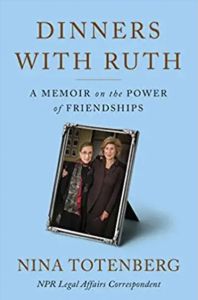
Dinners with Ruth
A Memoir on the Power of Friendships
ISBN: 9781982188085
Pages: 320
Recommendation
Over the course of her career, National Public Radio’s Nina Totenberg has built a distinguished journalism portfolio and a family of friends she describes with insight and warmth, including fellow journalists Cokie Roberts and Linda Wertheimer, and Supreme Court justices Antonin Scalia, Lewis Powell and William Brennan, as well as Ruth Bader Ginsburg. The author and Ginsburg began their careers in male-dominated fields at the same time. They connected when Totenburg interviewed Ginsburg for a story and embarked on a long friendship encompassing Ginsburg’s tenure as a Supreme Court justice. This engaging narrative covers many colorful personalities, Totenburg’s personal history with Ginsburg, and the importance of friendship and love.
Summary
About the Author
NPR’s legal affairs correspondent Nina Totenberg has won numerous journalism awards, American Bar Association awards for excellence in legal reporting, and more than 24 honorary degrees.







Comment on this summary